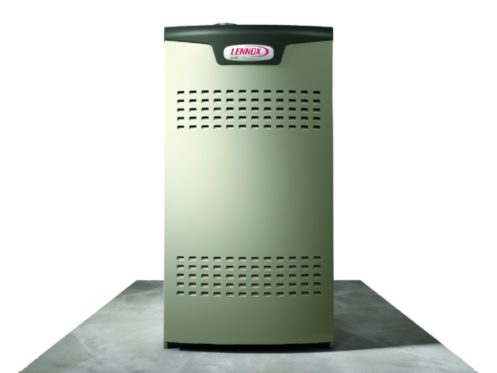Gas furnaces are one of the most common furnace types in the United States today. These reliable and efficient systems have no problem keeping your family warm over the long winter months. As your furnace ages, vital components can become worn out and allow gas to leak into the home. Homeowners must identify gas leaks as soon as possible to limit potential health impacts. Keep reading to learn more about common reasons behind furnace gas leaks.
Common Causes of Gas Leaks
One of the most likely issues behind a furnace gas leak is a problem with the heat exchanger. The heat exchanger safely stores the combustion gasses as they heat the air. The air is then pushed into the ductwork and throughout the home. Once the air is heated, the gasses are released outside the home. Unfortunately, heat exchangers are made of metal that expands when heated and constricts when cooled. Over the years, this part can wear out, developing cracks that allow gas to seep into your breathing air.
Heat exchangers can also prematurely develop damage due to overheating. If your furnace’s airflow is restricted due to a clogged filter or ductwork blockage, the system’s internal components will heat up. Many systems have safeguards to completely shut down the furnace before any wiring or parts can melt. However, frequent overheating issues will impact the safety and efficiency of the system over time.
Another common cause of furnace gas leaks is a dirty or broken flame sensor. This component ensures your HVAC system produces a flame and efficiently utilizes its fuel source. A flame sensor is a safety feature that prevents explosions and gas leaks. It will only open the gas valve when it knows the gas will safely burn.
If your flame sensor is compromised, it may allow the gas valve to open or close at random. This issue is often accompanied by water leaks, strange flame colors, and high utility bills. Without regular maintenance, many furnace components, from the burners to the gas valve, can become dirty or begin to malfunction and leak gas into the home.
Warning Signs of a Furnace Gas Leak
Your furnace is likely leaking gas if you notice the smell of sulfur or rotten eggs. Natural gas does not have an odor, which is part of the reason why it’s so dangerous. Gas companies add the odorant mercaptan so you can more easily identify leaks. If this smell is coming from your furnace or ductwork, turn off your main gas valve and exit your home.
Gas issues will also often impact the furnace’s flame color. This flame should be blue, but it can be yellow or orange if something is going wrong in the system. You may hear a gas leak in the form of a hissing sound. This often means gas is being forcefully pushed out of a crack in your heat exchanger or a hole in the gas line.
If your furnace is leaking gas, your family’s health could be at risk. You can experience headaches, fatigue, dizziness, confusion, or trouble with your memory. Children and elderly loved ones in your home are at the highest risk of serious health complications.
Minimizing Gas Leak Risks
Gas leaks are most common in the winter when you are running your furnace constantly to stay comfortable. Protect your family by scheduling regular HVAC maintenance. Your furnace should be serviced at least twice a year, preferably in the fall and spring. Scheduling maintenance in the fall ensures your HVAC system will efficiently produce heat for the coming winter. Schedule service again in the spring to limit seasonal wear and correct any new issues.
An experienced technician will quickly identify any problems with your heat exchanger, flame sensor, or gas line. They will ensure the furnace’s safety features are still intact and give you helpful advice on how to keep your home secure from gas leaks.
Your Trusted Local HVAC Company
Since 2017, Tyler’s Heating & Cooling has been the preferred heating and cooling company in Mishawaka, IN and the surrounding area. We are a veteran-owned company that is proud to have an A+ rating with the Better Business Bureau. Let us maintain or repair your furnace and air conditioner. We can also install a ductless HVAC system, test your indoor air quality, replace your thermostat, or offer ventilation solutions. Schedule your next HVAC appointment with the experts at Tyler’s Heating & Cooling today!

